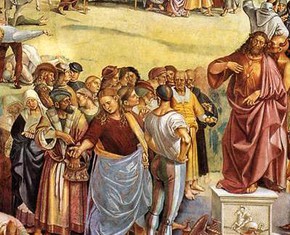The views expressed in our content reflect individual perspectives and do not represent the authoritative views of the Baha'i Faith.
Scholars, historians and clergy have tried, for centuries, to understand and explain the discrepancies in some Biblical prophecies. The Baha’i teachings offer explanations.
In the last chapter of the last book of the Old Testament, for example, God states: “Behold, I will send you Elijah the prophet before the coming of the great and dreadful day of the Lord.” – Malachi 4:5.
So the people asked John the Baptist if he was the return of Elijah, and he said no:
Now this is the testimony of John, when the Jews sent priests and Levites from Jerusalem to ask him, ’Who are you?’ … And they asked him, ’What then? Are you Elijah?’ He said, ’I am not.’ ’Are you the Prophet?’ And he answered, ’No.’” – John 1:19-21.
But Jesus stated that John the Baptist was Elijah:
Assuredly, I say to you, among those born of women there has not risen one greater than John the Baptist … And if you are willing to receive it, he is Elijah who is to come. He who has ears to hear, let him hear! – Matthew 11:11-15.
For an explanation of this seeming conundrum, Baha’is turn to Abdu’l-Baha, who stated:
If John was Elias, why did he say he was not, and why did Christ say he was? The reason is that we consider here not the individuality of the person but the reality of his perfections—that is to say, the very same perfections that Elias possessed were realized in John the Baptist as well. Thus John the Baptist was the promised Elias. What is being considered here is not the essence but the attributes. – Abdu’l-Baha, Some Answered Questions, newly revised edition, p. 150.
Though there appears at first glance to be a discrepancy in the Scripture, using this approach we can comprehend the Scripture with confidence, and find the unity of its true meaning:
All Scripture is given by inspiration of God, and is profitable for doctrine, for reproof, for correction, for instruction in righteousness… – II Timothy 3:16.
… for God is not the author of confusion but of peace … – I Corinthians 14:33.
The Baha’i interpretation that the “return” means the return of the inner reality, and not a literal physical return, is supported by this verse from the Gospel:
[But the angel said] “He [John the Baptist] will also go before Him in the spirit and power of Elijah” … – Luke 1:17.
Similarly, Jesus said:
However, when He, the Spirit of Truth has come, He will guide you into all truth; for He will not speak on His own authority, but whatever He hears He will speak; and He will tell you things to come. He will glorify Me … – John 16:13.
Many Biblical scholars generally understand this passage as a prophecy of the inspiration of the Holy Spirit at Pentecost. However, it can be understood as a prophecy of the appearance of the prophet to succeed Jesus when compared to the verses that follow. In these words, spoken by God to Moses, we see the terminology God uses to foreshadow the appearance of a prophet:
I will raise up for them a Prophet like you from among their brethren, and will put My words in His mouth, and He shall speak to them all that I command Him. – Deuteronomy 18:18.
This is universally understood by Christians to be a prophecy of Jesus Christ. But look carefully at how the “Prophet” is foretold in the previous verse, and compare it to these words of Jesus, describing the source of his revelation:
For I have not spoken on my own authority; but the Father who sent Me gave Me a command, what I should say and what I should speak. And I know that His command is everlasting life. Therefore, whatever I speak, just as the Father has told Me, so I speak. – John 12:49-50.
This prophecy by Jesus of the one to follow him reflects the same spirit:
However, when He, the Spirit of truth has come, He will guide you into all truth; for He will not speak on His own authority, but whatever He hears He will speak; and He will tell you things to come. He will glorify Me … – John 16:13.
Abdu’l-Baha, interpreting these words of Jesus, states:
Now consider carefully that the words “for he shall not speak of himself; but whatsoever he shall hear, that shall he speak” clearly imply that the Spirit of truth is embodied in a Man Who has a soul, Who has ears to hear and a tongue to speak. Likewise Christ is called the “Spirit of God”, in the same way that we speak of the light and yet mean both the light and the lamp. – Some Answered Questions, newly revised edition, p. 123.
In confirmation of this, Baha’u’llah writes in his Tablet to the Christians:
Verily, He Who is the Spirit of Truth is come to guide you unto all truth. He speaketh not as prompted by His own self, but as bidden by Him Who is the All-Knowing, the All-Wise. Say, this is the One Who hath glorified the Son and hath exalted His Cause. – Tablets of Baha’u’llah, p. 12.
















Comments
Sign in or create an account
Continue with Googleor